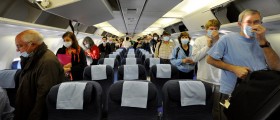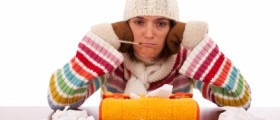
Swine influenza, consequence of H1N1 virus, during last year has caused many anxiety and fear in the world. It is important to note that the swine flu is just one type of ordinary seasonal flu. But, because swine influenza virus is new, people have not developed immunity to it yet, and it easily transmits from person to person. This creates possibility to cause a global epidemy. Symptoms of swine flu are the same as for ordinary flu and include: high temperature, runny nose, stuffy nose, muscle ache, headache, cough, chills, diarrhea or vomiting. Swine flu can have serious consequences such as respiratory failure. A group of high-risk people who might be affected by severe swine flu infection includes: pregnant women, people with chronic diseases, elderly people, overweight people and children under age two years old.
If you suspect that your child shows symptoms of swine flu, you should avoid other people and make the necessary testing - samples should be sent to local and state health departments and CDC for confirmation of swine flu. In the case of infection, if your child shows symptoms such as breathing problems, not drinking enough fluids, severe and persistent vomiting, nervousness especially not wanting to be held, gray or bluish skin color, not waking up, it is necessary to seek immediate medical help. It is important to note that many hospitalizations and more than a quarter of the deaths from swine flu are in young people under the age of 25. However, runny nose, cough can also be signs of common cold with children and thus there is no need to panic.
Swine influenza generally spreads by direct contact with droplets from coughing or sneezing of infected person. Respiratory secretions can survive for several hours on the door handles, glass surfaces, kitchen elements so it is necessary to frequently wash your hands. Infected people are contagious a day before they feel symptoms of swine flu and seven days after the occurrence of first symptoms. It is important to note that this is a period of allergies and colds and sinus infections. It means that a lot of people will not graze swine flu, but precautions must be taken.
When it comes to treatment, there are medications (Tamiflu, Relanza) for the prevention and treatment of swine flu in high-risk children. In addition, the most important thing is prevention. Therefore, CDC is appealing kindergartens to check children health every day, to separate sick children, to encourage sick children to stay home until they are free of fever for at least 24 hours, to encourage proper hand washing and teach children to properly cover their coughing and sneezing to prevent further spreading infection.

















Your thoughts on this
Loading...